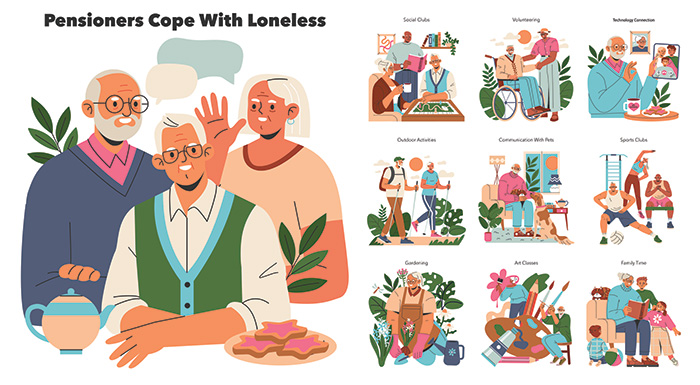For several years, surveys conducted by the University of Michigan’s National Poll on Healthy Aging have reported that many older adults feel lonely or socially isolated. Those feelings grew during the pandemic, when seniors were encouraged to avoid unnecessary social interactions.
While the sense of being socially isolated improved after vaccines reduced the risk of contracting a COVID-19 infection, about a third of older adults still report having infrequent contact with individuals outside of their own homes. Feelings of social isolation are greatest among seniors who suffer from poor physical or mental health, as well as those who have disabling conditions that limit their daily activities. The surveys also show that women are somewhat more likely to feel lonely than men.
To the extent that social isolation breeds loneliness, a potential cure is to live a less isolated life. Moving to an independent living community gives seniors the chance to interact with others who have left the daily grind of fulltime employment. Disabled older adults who depend on others for care might equally benefit from the companionship of other seniors who reside in an assisted-living facility.
Senior Living Communities
A 2025 survey by U.S. News asked older adults who had recently moved to a senior living community about their feelings of loneliness before and after the move. The survey found that 69% of seniors felt lonely most of the time before they moved to a senior living environment. After the move, only 42% reported feeling lonely a majority of the time. Most felt an improvement in their feelings of loneliness or isolation after making the move.
Almost two-thirds of the surveyed seniors said it was easier to meet other people after moving to a senior living community. A whopping 85% of survey participants reported making new friends after the move. The survey also found that seniors were 21% more likely to find meaning and purpose in their daily lives after moving to a senior living community.
Protecting Seniors from Loneliness
Senior living communities offer a safeguard against loneliness in multiple ways. Most retirement communities offer residents the opportunity to participate in a variety of activities, from hobby rooms to pickleball courts. Taking a photography class or joining a community book club can set the stage for seniors to spark new friendships. Residents who share an interest in playing cards, sewing, or practicing their putting can easily find common ground that leads to social relationships.
Many communities offer meal plans and a dining room. Breaking bread with strangers is often the first step toward friendship. Organized activities, such as musical or dramatic performances produced by residents, create opportunities to socialize. Taking a shopping trip on a bus or van with other residents gives residents a chance to interact with others inside and outside the walls of their community.
Fitness rooms and exercise classes also give residents a chance to meet while encouraging physical activity that can ward off depression. A study in 2021 found that people who join exercise groups feel less lonely and are less likely to suffer from depression.
Social Support in Times of Declining Health
About two-thirds of participants in the U.S. News survey reported that loneliness contributed to declining health before they moved to a senior living community. A third of the participants reported that their health improved after they made the move.
In addition to helping residents with their activities of daily living, assisted-living facilities promote good health through medication management and by encouraging residents to remain as active as their physical limitations permit. Assisted-living facilities typically provide transportation to doctor’s offices and many organize trips to malls, museums, and concerts.
Whether a senior transitions to an independent living community or an assisted-living facility, she is likely to have more opportunities to socialize than she would have as the only occupant of a family home that now feels empty. Older parents enjoy visits by their adult children and other relatives and friends while having the chance to build bonds with people of a similar age who are happy to overcome their sense of social isolation and loneliness.
